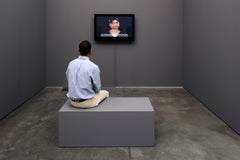This month, Iniva Creative Learning co-founder Lyn French reflects on the common ground covered by artists and therapists and outlines how our Emotional Learning Cards can support the work of therapists.
If you are interested in our Cards and associated resources then do visit our Store page
 Visual artists explore the same terrain as therapists. The two disciplines share an interest in the conscious and unconscious forces which shape our lives. Therapists and artists alike will be keenly interested in what makes us ‘tick’. What are the dominant anxieties underpinning current preoccupations? Do their roots lie in forgotten or unrevealed experiences from the past? What is being avoided or denied? And what defences do we erect to keep these powerful, often primitive, anxieties at bay? How might these defences, ostensibly designed to protect us, unwittingly act against us, fuelling conflicts, blocking communication and obstructing or blurring any view of the bigger picture? As we know, common anxieties about coming across as lacking intellectually or socially or being in some way ‘out of step’ with others can lead us to rely too heavily on compensatory behaviour such as never acknowledging mistakes or vulnerabilities of any kind.
Visual artists explore the same terrain as therapists. The two disciplines share an interest in the conscious and unconscious forces which shape our lives. Therapists and artists alike will be keenly interested in what makes us ‘tick’. What are the dominant anxieties underpinning current preoccupations? Do their roots lie in forgotten or unrevealed experiences from the past? What is being avoided or denied? And what defences do we erect to keep these powerful, often primitive, anxieties at bay? How might these defences, ostensibly designed to protect us, unwittingly act against us, fuelling conflicts, blocking communication and obstructing or blurring any view of the bigger picture? As we know, common anxieties about coming across as lacking intellectually or socially or being in some way ‘out of step’ with others can lead us to rely too heavily on compensatory behaviour such as never acknowledging mistakes or vulnerabilities of any kind.
Paradoxically, as all therapists recognise, when we strengthen our emotional muscle and are more able to own our humanity, when we face up to and explore our vulnerabilities and our capacity both to be hurt and to hurt others and when we accept the uncertainties of life, surprisingly we feel more grounded, contained and secure. This is because looking back on our experiences and learning from them is ultimately empowering, albeit painful. We begin to see patterns in relationships and can take action where needed. We’re more likely to understand what angers or upsets us and to recognise trigger points which makes it possible to step back before we are drawn too far in. We’re not so easily ambushed by strong, unprocessed feelings such as unexpected anger, shame, jealousy or fear. We can let go of our ‘ego ideal’ (that picture we carry of ourselves which we try to live up to or who we’d like to believe we are!) and accept that our positive sense of self will unavoidably be punctured by accurate feedback or setbacks, leaving us with narcissistic wounds, some deeper than others.
Understandably, most clients – like all of us – fear moving too close to the source of pain. They might use words as a way of orbiting around their tender spots but never quite getting there. Or they depend on silences to put off shared dialogue that may ultimately reveal or uncover what they’re trying to avoid.
In these circumstances images by contemporary artists can be a powerful tool, acting as a bridge into personal reflection. The contemporary art works shown in both sets of our Emotional Learning Cards ‘What do you feel?’ and ‘Who are you? Where are you going?’ have been selected as they are rich in potential meaning. When a client describes and interprets these images it can lead to their discovering new and often unexpected angles on themes that resonate for them. Rather than tackling a source of pain or anxiety directly, the Cards offer a different path. The artworks held within them enable the client to ‘make their own way’ to the source, finding references to it in the images displayed.
The Cards can also build a client’s confidence in the art of free association, a term which describes the capacity to let the mind roam (with all the potential risks implied), make connections, create a narrative flow or stream of consciousness and look at the world from a number of different perspectives without recourse to labelling any one view as right or wrong or necessarily positive or negative.
The works depicted in the Cards convey that people living today from across the globe are dedicating themselves to creating art so that they might understand and communicate important issues about personal, family or cultural histories. How close this concern is to the work of the therapist!